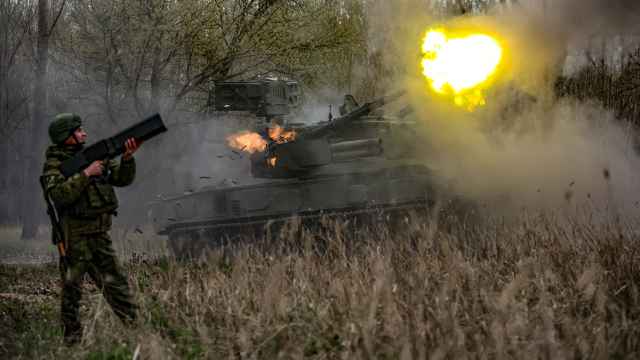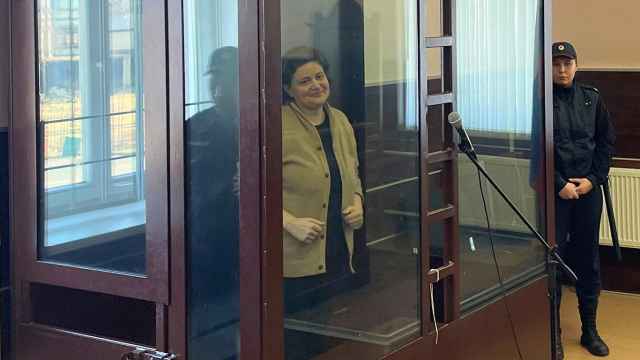Lax laws and poor enforcement make Russia a popular source for people forced into slave labor and prostitution, a leading international expert on human trafficking said Tuesday.
The problem is also growing within Russia with more people being exploited now than in recent years — a dark side to the country's still-robust economy and a reflection of a growing disparity in wealth, said U.S. Ambassador-at-Large Luis CdeBaca.
CdeBaca, who also heads the U.S. Department of State's Office to Monitor and Combat Trafficking in Persons, spoke at the first Russian-American forum on human trafficking, which opened in Moscow on Tuesday.
The issue is not to be underestimated, he said; the human trafficking business worldwide rakes in about $31 billion annually, while the loss of wages from slave labor is about $21 billion.
Trafficked people come from the poor regions in Russia's far east, north and south, as well as former Soviet republics, analysts said at the conference.
Many victims, primarily Central Asian nationals, are made to work at the capital's numerous real estate projects. Others are forced into donating organs, child rearing or prostitution.
One million people in Russia face "exploitative" labor conditions, which include physical abuse, withholding documents and payment, and poor living conditions, according to a Migration Research Center estimate released in June.
Russia is the second-largest destination of migrants after the United States, said International Organization of Migration Russia head Enrico Ponziani.
"The huge movements of people mean there will always be space for traffickers to exploit the situation," Ponziani said.
The United States has classified Russia as a "tier-2 watch list" country for the eighth year in a row in 2011. That means the government did not fully comply with the U.S. Trafficking Victims Protection Act of 2000, but is making efforts to improve.
Efforts by the Russian government to combat human trafficking include the signing and ratification of the United Nations' Convention Against Transnational Organized Crime, in 2000 and 2004, respectively.
Between 1,000 and 1,200 cases against traffickers are brought annually, and most end in guilty verdicts, according to Alexander Krasnov, who oversees drug and human trafficking issues at the Interior Ministry.
But much more still needs to be done, experts said.
While some are convicted, traffickers often get short prison terms — from three years to seven, compared with up to 40 years in the United States, said Vera Gracheva, coordination adviser at the Organization for Security and Cooperation in Europe.
A comprehensive anti-trafficking bill has been stalled in the State Duma for several years, though Krasnov said it might be passed in the first parliamentary session to follow the legislative elections, set for Dec. 4.
Russia's existing trafficking laws are not precise enough to define what exactly constitutes human trafficking, experts said.
The country's vast size and thousands of kilometers of porous borders also pose a challenge.
Besides, there are no laws protecting the victim. Rehabilitation shelters for victims are largely improvised grassroots efforts by cash-strapped nonprofit organizations or even individual activists.
One such shelter is Oratorium, located in the southern city of Astrakhan. The shelter employs four people, and nine former trafficking victims volunteer part-time. The shelter rehabilitated seven out of 32 victims between 2010 and 2011, said its director, Eduard Perepelkin.
In addition to Oratorium, many concerned citizens in the south offer help to the burgeoning number of trafficked workers from Central Asia who arrive there, but their efforts often dissipate due to a lack of resources, he said.
U.S. Ambassador John Beyrle and Russian ombudsman Vladimir Lukin also attended the forum on Tuesday. The Health and Social Development Ministry dispatched a senior official with a statement of support from Minister Tatyana Golikova.
"It's a good sign that the ministry is thinking about it," CdeBaca said.
A Message from The Moscow Times:
Dear readers,
We are facing unprecedented challenges. Russia's Prosecutor General's Office has designated The Moscow Times as an "undesirable" organization, criminalizing our work and putting our staff at risk of prosecution. This follows our earlier unjust labeling as a "foreign agent."
These actions are direct attempts to silence independent journalism in Russia. The authorities claim our work "discredits the decisions of the Russian leadership." We see things differently: we strive to provide accurate, unbiased reporting on Russia.
We, the journalists of The Moscow Times, refuse to be silenced. But to continue our work, we need your help.
Your support, no matter how small, makes a world of difference. If you can, please support us monthly starting from just $2. It's quick to set up, and every contribution makes a significant impact.
By supporting The Moscow Times, you're defending open, independent journalism in the face of repression. Thank you for standing with us.
Remind me later.





